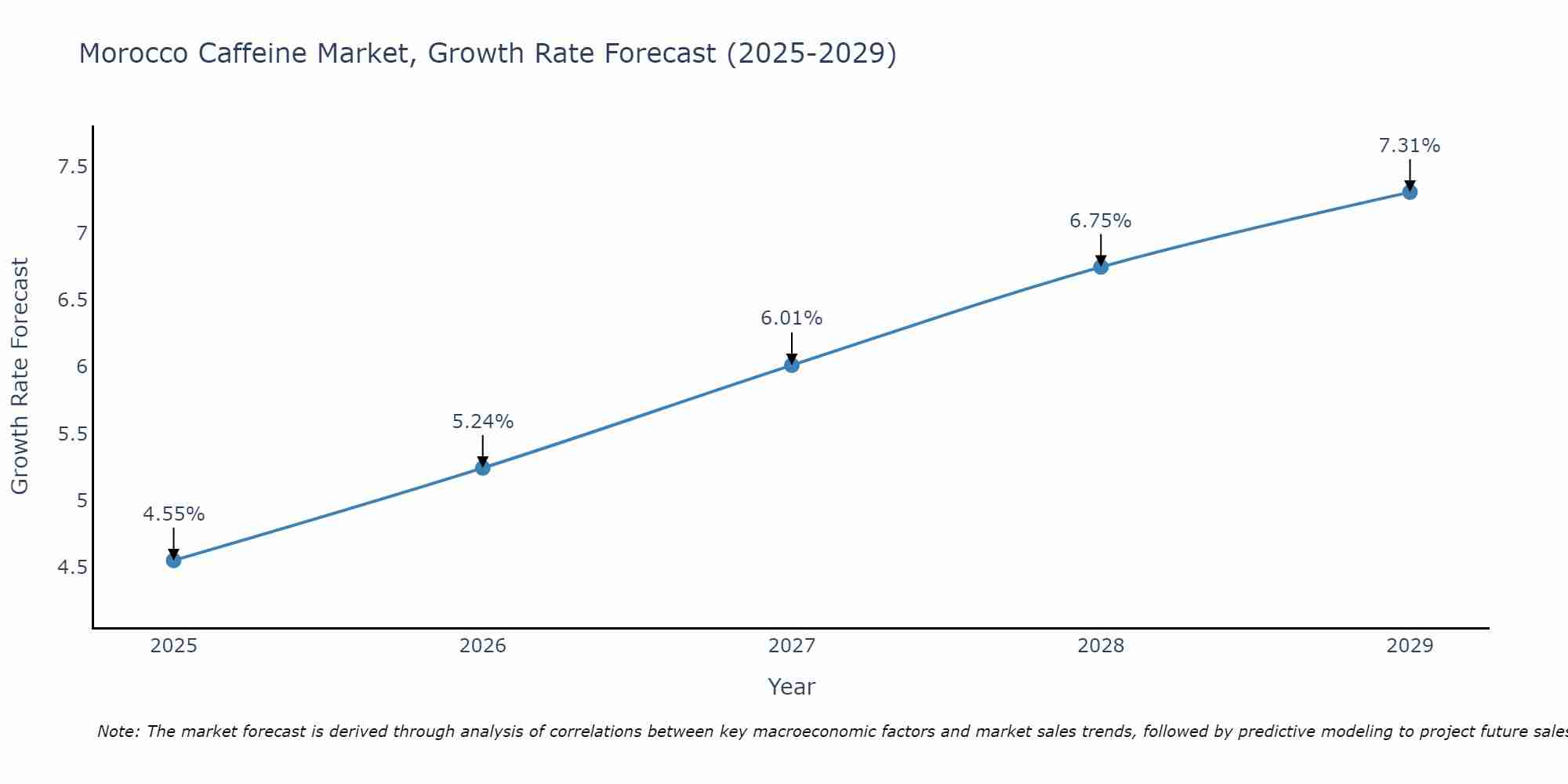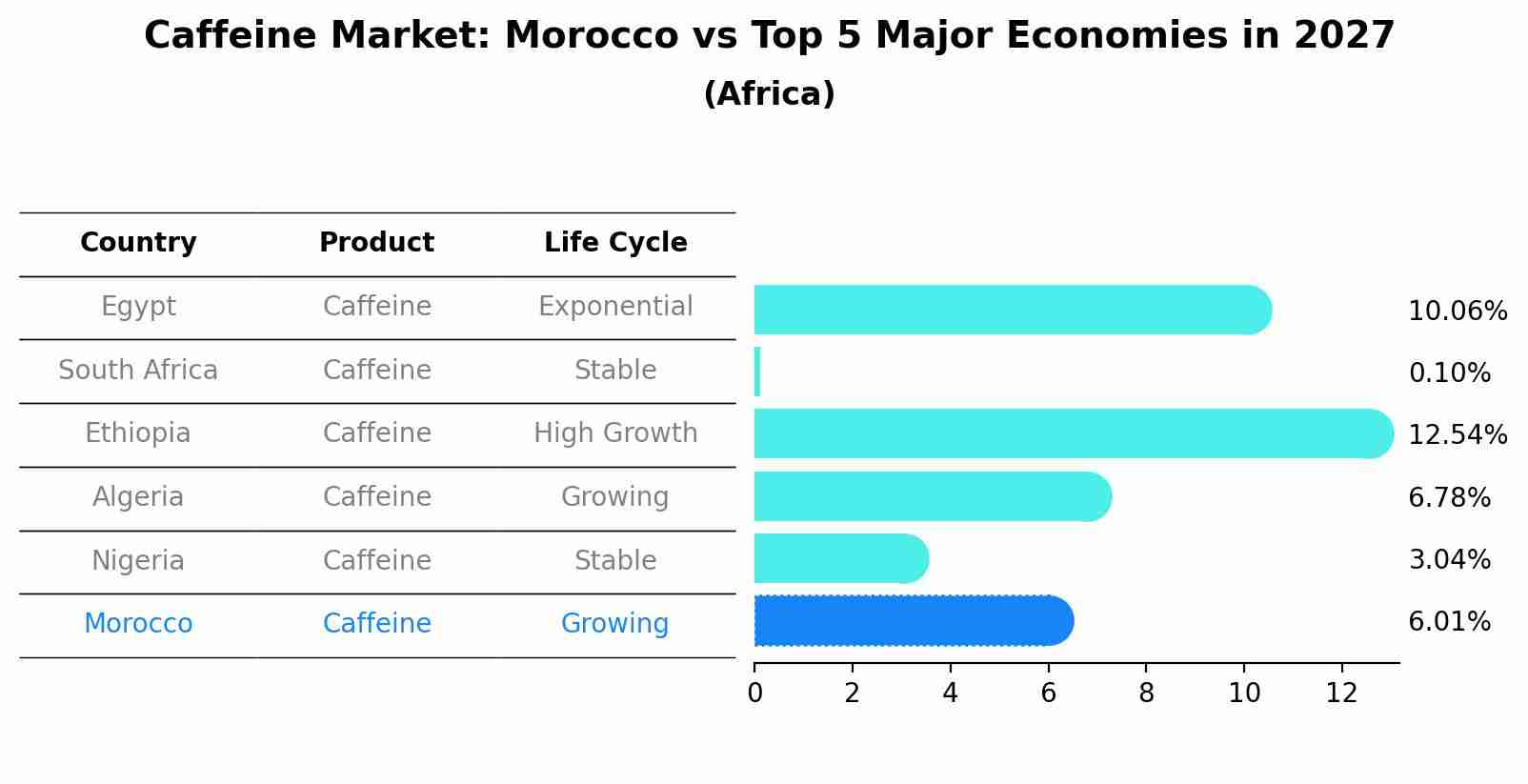Morocco Caffeine Market (2025-2031) Outlook | Value, Revenue, Size, Companies, Forecast, Share, Analysis, Growth, Trends & Industry
| Product Code: ETC110052 | Publication Date: Jun 2021 | Updated Date: Apr 2025 | Product Type: Report | |
| Publisher: 6Wresearch | Author: Ravi Bhandari | No. of Pages: 70 | No. of Figures: 35 | No. of Tables: 5 |
Morocco Caffeine Market Size Growth Rate
The Morocco Caffeine Market is likely to experience consistent growth rate gains over the period 2025 to 2029. Commencing at 4.55% in 2025, growth builds up to 7.31% by 2029.

Caffeine Market: Morocco vs Top 5 Major Economies in 2027 (Africa)
In the Africa region, the Caffeine market in Morocco is projected to expand at a growing growth rate of 6.01% by 2027. The largest economy is Egypt, followed by South Africa, Ethiopia, Algeria and Nigeria.

Morocco Caffeine Market Synopsis
Caffeine is a natural stimulant found in coffee, tea, and various energy drinks and supplements. In Morocco, the caffeine market is driven by the growing consumption of coffee and tea among the population. The market is witnessing the introduction of innovative products, such as caffeinated beverages and dietary supplements, catering to the evolving consumer preferences for energy-boosting products.
Drivers of the market
The caffeine market in Morocco is primarily driven by the growing consumption of caffeinated beverages such as coffee, tea, and energy drinks. Caffeine, known for its stimulating effects on the central nervous system, is widely consumed for its ability to increase alertness and improve cognitive function. The rising trend of coffee culture, increasing consumer awareness regarding health benefits associated with moderate caffeine consumption, and the introduction of innovative caffeinated products contribute to the market growth of caffeine in Morocco.
Challenges of the market
Challenges in the Morocco Caffeine Market include health concerns and regulatory restrictions. Increasing awareness of the potential health risks associated with excessive caffeine consumption has led to a demand for products with reduced or alternative caffeine content. Additionally, stringent regulations on food and beverage additives require manufacturers to adhere to strict guidelines, which can increase production costs.
Government Policy of the market
To support the caffeine market, Morocco has focused on developing its agricultural sector, particularly coffee and tea production. Policies include subsidies for local farmers, investment in modern agricultural techniques, and support for export initiatives to position Morocco as a competitive player in the global caffeine market.
Key Highlights of the Report:
- Morocco Caffeine Market Outlook
- Market Size of Morocco Caffeine Market, 2024
- Forecast of Morocco Caffeine Market, 2031
- Historical Data and Forecast of Morocco Caffeine Revenues & Volume for the Period 2021-2031
- Morocco Caffeine Market Trend Evolution
- Morocco Caffeine Market Drivers and Challenges
- Morocco Caffeine Price Trends
- Morocco Caffeine Porter's Five Forces
- Morocco Caffeine Industry Life Cycle
- Historical Data and Forecast of Morocco Caffeine Market Revenues & Volume By Type for the Period 2021-2031
- Historical Data and Forecast of Morocco Caffeine Market Revenues & Volume By Natural Caffeine for the Period 2021-2031
- Historical Data and Forecast of Morocco Caffeine Market Revenues & Volume By Synthetic Caffeine for the Period 2021-2031
- Historical Data and Forecast of Morocco Caffeine Market Revenues & Volume By Applications for the Period 2021-2031
- Historical Data and Forecast of Morocco Caffeine Market Revenues & Volume By Pharmaceuticals for the Period 2021-2031
- Historical Data and Forecast of Morocco Caffeine Market Revenues & Volume By Food for the Period 2021-2031
- Historical Data and Forecast of Morocco Caffeine Market Revenues & Volume By Beverages for the Period 2021-2031
- Historical Data and Forecast of Morocco Caffeine Market Revenues & Volume By Flavours and Fragrances for the Period 2021-2031
- Morocco Caffeine Import Export Trade Statistics
- Market Opportunity Assessment By Type
- Market Opportunity Assessment By Applications
- Morocco Caffeine Top Companies Market Share
- Morocco Caffeine Competitive Benchmarking By Technical and Operational Parameters
- Morocco Caffeine Company Profiles
- Morocco Caffeine Key Strategic Recommendations
Frequently Asked Questions About the Market Study (FAQs):
Export potential assessment - trade Analytics for 2030
Export potential enables firms to identify high-growth global markets with greater confidence by combining advanced trade intelligence with a structured quantitative methodology. The framework analyzes emerging demand trends and country-level import patterns while integrating macroeconomic and trade datasets such as GDP and population forecasts, bilateral import–export flows, tariff structures, elasticity differentials between developed and developing economies, geographic distance, and import demand projections. Using weighted trade values from 2020–2024 as the base period to project country-to-country export potential for 2030, these inputs are operationalized through calculated drivers such as gravity model parameters, tariff impact factors, and projected GDP per-capita growth. Through an analysis of hidden potentials, demand hotspots, and market conditions that are most favorable to success, this method enables firms to focus on target countries, maximize returns, and global expansion with data, backed by accuracy.
By factoring in the projected importer demand gap that is currently unmet and could be potential opportunity, it identifies the potential for the Exporter (Country) among 190 countries, against the general trade analysis, which identifies the biggest importer or exporter.
To discover high-growth global markets and optimize your business strategy:
Click Here- Single User License$ 1,995
- Department License$ 2,400
- Site License$ 3,120
- Global License$ 3,795
Search
Thought Leadership and Analyst Meet
Our Clients
Related Reports
- India Switchgear Market Outlook (2026 - 2032) | Size, Share, Trends, Growth, Revenue, Forecast, Analysis, Value, Outlook
- Pakistan Contraceptive Implants Market (2025-2031) | Demand, Growth, Size, Share, Industry, Pricing Analysis, Competitive, Strategic Insights, Strategy, Consumer Insights, Analysis, Investment Trends, Opportunities, Revenue, Segments, Value, Segmentation, Supply, Forecast, Restraints, Outlook, Competition, Drivers, Trends, Companies, Challenges
- Sri Lanka Packaging Market (2026-2032) | Outlook, Competition, Drivers, Trends, Demand, Pricing Analysis, Competitive, Strategic Insights, Companies, Challenges, Strategy, Consumer Insights, Analysis, Investment Trends, Opportunities, Growth, Size, Share, Industry, Revenue, Segments, Value, Segmentation, Supply, Forecast, Restraints
- India Kids Watches Market (2026-2032) | Strategy, Consumer Insights, Analysis, Investment Trends, Opportunities, Growth, Size, Share, Industry, Revenue, Segments, Value, Segmentation, Supply, Forecast, Restraints, Outlook, Competition, Drivers, Trends, Demand, Pricing Analysis, Competitive, Strategic Insights, Companies, Challenges
- Saudi Arabia Core Assurance Service Market (2025-2031) | Strategy, Consumer Insights, Analysis, Investment Trends, Opportunities, Growth, Size, Share, Industry, Revenue, Segments, Value, Segmentation, Supply, Forecast, Restraints, Outlook, Competition, Drivers, Trends, Demand, Pricing Analysis, Competitive, Strategic Insights, Companies, Challenges
- Romania Uninterruptible Power Supply (UPS) Market (2026-2032) | Industry, Analysis, Revenue, Size, Forecast, Outlook, Value, Trends, Share, Growth & Companies
- Saudi Arabia Car Window Tinting Film, Paint Protection Film (PPF), and Ceramic Coating Market (2025-2031) | Strategy, Consumer Insights, Analysis, Investment Trends, Opportunities, Growth, Size, Share, Industry, Revenue, Segments, Value, Segmentation, Supply, Forecast, Restraints, Outlook, Competition, Drivers, Trends, Demand, Pricing Analysis, Competitive, Strategic Insights, Companies, Challenges
- South Africa Stationery Market (2025-2031) | Share, Size, Industry, Value, Growth, Revenue, Analysis, Trends, Segmentation & Outlook
- Afghanistan Rocking Chairs And Adirondack Chairs Market (2026-2032) | Size & Revenue, Competitive Landscape, Share, Segmentation, Industry, Value, Outlook, Analysis, Trends, Growth, Forecast, Companies
- Afghanistan Apparel Market (2026-2032) | Growth, Outlook, Industry, Segmentation, Forecast, Size, Companies, Trends, Value, Share, Analysis & Revenue
Industry Events and Analyst Meet
Whitepaper
- Middle East & Africa Commercial Security Market Click here to view more.
- Middle East & Africa Fire Safety Systems & Equipment Market Click here to view more.
- GCC Drone Market Click here to view more.
- Middle East Lighting Fixture Market Click here to view more.
- GCC Physical & Perimeter Security Market Click here to view more.
6WResearch In News
- Doha a strategic location for EV manufacturing hub: IPA Qatar
- Demand for luxury TVs surging in the GCC, says Samsung
- Empowering Growth: The Thriving Journey of Bangladesh’s Cable Industry
- Demand for luxury TVs surging in the GCC, says Samsung
- Video call with a traditional healer? Once unthinkable, it’s now common in South Africa
- Intelligent Buildings To Smooth GCC’s Path To Net Zero


















